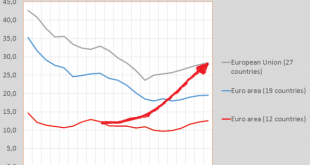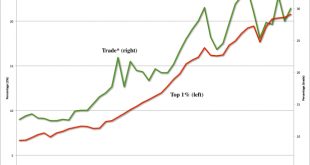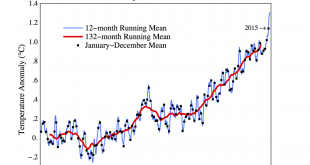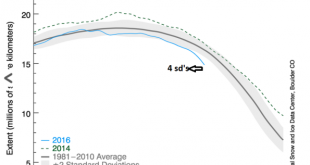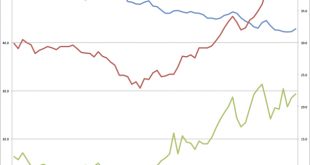So, ‘What’s it going to be then, eh’? Will we let migration wreck the EU or will we opt for sound macro policies? The non-far right should double down on the present freedom of movement of people inside the EU. But only when credible macro-economic demand and welfare policies are installed. Otherwise, the internal inconsistencies of the present macro-economic set up will fracture the EU. Which means that the freedom of capital flows, one of the other EU freedoms, might have to be...
Read More »Mainstream economists, globalization, and Trump
from David Ruccio Are mainstream economists responsible for electing Donald Trump? I think they deserve at least part of the blame. So, as it turns out, does Dani Rodrick. My argument is that, when mainstream economists in the United States embraced and celebrated neoliberalism—both the conservative and “left” versions—they created the conditions for Trump’s victory in the U.S. presidential election. As I see it, mainstream economists adopted neoliberalism as a set of ideas (about...
Read More »Blame globalization?
David Ruccio Chris Dillow is right about one thing: citing globalization as the reason for the success of Donald Trump’s campaign, especially among working-class voters, “suits some people very well for foreigners to get the blame rather than for inequality and the health of capitalism to come under scrutiny.” But that doesn’t mean that, alongside many other factors (from the decline in labor unions to increasing automation), globalization—to be precise, capitalist globalization—doesn’t...
Read More »Above the rising trend. Update on global temperature
From: Geoff Davies (reblogged from: Our better nature) (a comparable graph not including 2016 has been published a few days ago, developments in 2016 are however so extreme and out of sample that this data has to be included, too, M.K.) A couple of graphs show the extraordinary nature of the present situation. 1998 used to be one of the biggest outliers from the general trend. 2016 is going way beyond that. The second graph shows the deviation from the recent trend more clearly: It...
Read More »Food and Justice
The WEA online conferenceFood and JusticeIdeas for a new global food agenda is now openThe DISCUSSION FORUM is open access.
Read More »Surviving the Age of Trump
from Dean Baker I will claim no special insight into the politics that led to Trump’s election last Tuesday. I was as surprised as anyone else when not just Florida and North Carolina, but also Pennsylvania, Michigan, and Wisconsin started to turn red. But that’s history now. We have to live with the fact of President Trump and we have to figure out how to protect as much as possible of what we value in this country from his presidency. This won’t be easy when the Republicans control both...
Read More »Two little black swans
Most tables of the normal distribution stop at 3 standard distributions or, to state this differently, at the point were (assuming a stable world) the chance that an individual estimate of a variable is farther removed from the average of all estimated variables is 1:1000. Let’s call this the black swan point. Estimates further removed from the average are ‘black swans’. Such estimates might indicate that we’ve moved to a new situation with a new average. Ahem: arctic and antarctic sea...
Read More »Deregulation, austerity and the polarization of labour markets
from Maria Alejandra Madi The huge growth of deregulated finance has been associated to a new financial regime and great transformations in the pattern of economic growth. Looking back, there has been a narrow relationship between the crisis of the post-war accumulation pattern, the evolution of the international monetary system and the process of financial deregulation. In fact, as Bello (2006) warned, in the 1980s, Reaganism and structural adjustment were not successful attempts to...
Read More »James Meade Redux
from Peter Radford Well, that was fun. A rebellion has swept away the establishment. I never thought I would say that the rebellion would be manifested within the GOP and that the establishment would be within the Democrats, but that’s what we just witnessed. We on the left must accept that whatever we were saying just didn’t resonate with enough people. The Democrat’s obsession with identity politics that allowed it to ignore the consequences of its embrace of neoliberal economics has...
Read More »Monopsony, the labor market, and inequality
from David Ruccio For decades now, the labor share of U.S. national income (the blue line measured on the left-hand vertical axis in the chart above) has steadily declined, while the shares of income and wealth captured by the top 1 percent (the red and green lines on the right-hand axis) has increased. And in recent years, even as employment has mostly recovered from the Second Great Depression, the wages paid to the majority of workers have continued to stagnate (even while incomes...
Read More » Real-World Economics Review
Real-World Economics Review

